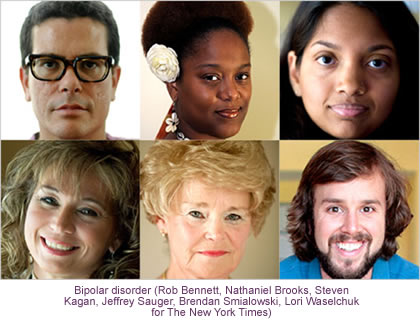Scientific American
July 17, 2008
When time doesn’t heal, the brain’s reward system may be playing a role
By Nicole Branan

Losing a loved one is always painful, but for most people time eventually heals the wounds. For about 10 to 20 percent of the bereaved, however, accepting and getting over a loss remains extremely difficult, even years later. Link to read more
Source: Scientific American News
Image Credit: Getty Images
 In the New York Times today, “Patient Voices,’’ created by Karen Barrow, gives a voice to bipolar disorder, featuring nine courageous people who share their own stories of diagnosis, treatment, struggle and acceptance. Link to read more
In the New York Times today, “Patient Voices,’’ created by Karen Barrow, gives a voice to bipolar disorder, featuring nine courageous people who share their own stories of diagnosis, treatment, struggle and acceptance. Link to read more
Among other featured you will meet Victoria Maxwell, 41, from Vancouver, British Columbia, who talks about the challenges she faced while dating and deciding whether to disclose her illness.
“I really wrestled with when do you tell somebody,’’ said Ms. Maxwell, who is now married. “Generally speaking I would let them get to know who I am, and if they didn’t like me for me, I couldn’t chalk it up to having bipolar disorder. click here to listen
Source: The New York Times, July 17 2008
Consumers talking on cell phones or dealing with a crying child in the store may make more impulsive purchases. A Central Michigan University study has found that consumers are more susceptible to making impulsive purchases for one brand over another if they are distracted while shopping. [continue reading…]
Anxiety is a normal human response to stress, but in some, it can develop into a disabling disorder of excessive and irrational fears, such as obsessive-compulsive disorder, panic disorder, or posttraumatic stress disorder. Effective treatments are available and can involve either behavioral therapy or medications. Although “it makes intuitive sense that combining these two treatments would result in even better results,” David Tolin, Ph.D. notes that has unfortunately not yet been the case and the majority of the evidence suggests that combined therapy is no more effective than behavior therapy alone, and in some cases can even be less effective. However, Dr. Tolin is one of the three authors on a meta-analysis scheduled for publication on June 15th in Biological Psychiatry, in which they evaluated a potentially important new treatment paradigm for anxiety. [continue reading…]


